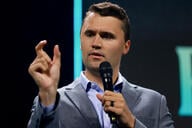You have /5 articles left.
Sign up for a free account or log in.

nito100/iStock/Getty Images Plus
For months, the Trump administration has threatened America’s most prestigious universities with investigations, lawsuits and holds on federal funding in the name of fighting antisemitism, eliminating “DEI” and promoting “viewpoint diversity.” These actions have hit universities hard. After months of negotiations, Columbia University admitted defeat, agreeing to pay the federal government more than $200 million, avoid the use of race-conscious admissions and take additional actions to address antisemitism on campus. After Columbia’s capitulation, Brown University made its own concessions. Harvard University continues to battle the administration in court, but may be open to settling as well. Now the University of California, Los Angeles, is under threat.
Even before he took office, President Trump made clear that he saw the world of higher education as a bastion of “woke” ideology, where faculty “indoctrinated” their students with left-wing ideas, including antisemitic views about Israel. This view of higher education has been promoted by conservative pundits for decades, and it has been used to justify the administration’s punitive actions toward Harvard and other universities. Rather than penalizing individual professors or students, the administration focused on freezing or even clawing back federal research grants and initiating civil rights investigations at more than 50 universities.
But is university education really as politically infused as some suggest? We have long known that most faculty members identify as political liberals, but how many support controversial progressive ideas about race, gender or “decolonization”? How many try to force these views upon their students? And how many hold views about Israel that Jewish students, or the Trump administration itself, would consider antisemitic?
As social scientists, we’re interested in answering these questions with reliable data. We have been studying issues of racism, antisemitism, pedagogy and politics on college campuses for more than a decade. During the spring 2025 semester, we conducted a study of more than 2,300 faculty members at research-intensive universities to understand their political ideology and its impact on their teaching.
The findings of our study are, in many ways, at odds with the picture of higher education that seems to be driving the administration’s actions. Faculty are often portrayed as activists, but we found that only a minority engaged in political activism or posted on social media about contentious issues like Israel, racism or Trump himself. Headlines have debated how professors teach about the Israeli-Palestinian conflict, but in our survey more than three-quarters of faculty said that the conflict never came up in their classes at all, and fewer than 10 percent of faculty reported actively teaching about it.
Faculty have been accused of indoctrinating students, but most faculty we surveyed said they would present students with arguments from a variety of perspectives when teaching controversial issues. And although it’s true that many faculty are deeply critical of the Israeli government’s actions, we found that only around 10 percent of faculty expressed views about Jews or Israel that Jewish students, or widely used definitions, consider antisemitic. Furthermore, these faculty were more likely to agree with traditional anti-Jewish stereotypes—such as the belief that “Jews in America have too much power”—than they were to express support for Hamas.
These findings do not suggest that concerns about antisemitism or ideological diversity on campuses are misplaced. Our earlier work found that, especially after Oct. 7, many Jewish students felt a climate of antisemitic hostility on their campus, although this research also indicates that fellow students, rather than faculty, are more likely to be the source of problems for Jewish students.
Antisemitism task forces set up at many universities highlighted a number of cases where individual faculty members engaged in deeply problematic behavior, both with regard to how they treated Jewish students and how they taught about highly contentious political issues. Most existing faculty codes of conduct already prohibit this sort of behavior and should be enforced.
What our work suggests, however, is that efforts to combat antisemitism and promote diversity of thought on American campuses would be better served by treating faculty as allies, rather than enemies. Most faculty we surveyed want to help students see both sides of political conflicts, if they even teach about these conflicts at all, and are unlikely to express the most inflammatory statements about Israel that have roiled college campuses since Oct. 7, 2023.
At the same time, amid all the concerns about antisemitism related to criticism of Israel, our findings suggest that age-old conspiracy theories about “Jewish power” remain a problem on campus. One concern is that the extraordinary actions that the government has taken in the name of fighting antisemitism, including punishing entire universities, cutting off funding for medical research and sending masked federal agents to detain an international student who wrote a critical op-ed, may actually be feeding these conspiratorial, anti-Jewish beliefs.
The challenges that have ostensibly motivated the Trump administration’s attacks on Harvard, Columbia, Brown, UCLA and other universities are genuine. Although 90 percent of faculty express little hostility to Jews and Israel, the actions of a few faculty members can shape the climate of an entire campus. Treating these actions as justification for punishing faculty as a whole is not, however, a useful strategy for combating discrimination or improving higher education. Changes need to be made to address these concerns, but it is difficult to imagine that they will be effective if faculty are not part of the process.



